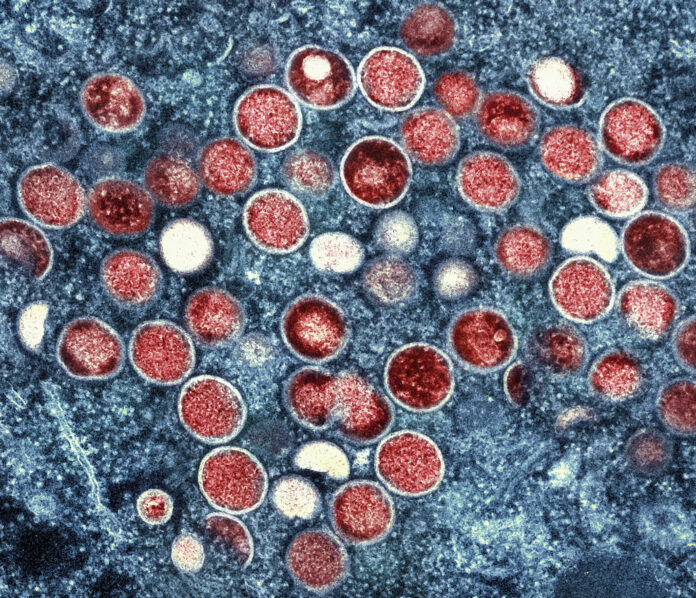Canadian health officials will provide a monkeypox update on Wednesday after the World Health Organization (WHO) declared the outbreak a global health emergency over the weekend.
The briefing comes as Canada’s confirmed monkeypox case count hit 681 on July 23. Globalnews.ca will be live-streaming the update, which is scheduled to begin at 1 p.m. EDT.
Majority of the country’s cases have been found in Quebec and Ontario, which logged 331 and 288, respectively, as of July 23. British Columbia has 48 confirmed cases, Alberta with 12, and Saskatchewan with two.
Since July 1, Canada has seen monkeypox cases double, including the first in Saskatchewan and the first in a female in Ontario, Public Health Agency of Canada (PHAC) officials said on July 23. Infections are expected to continue to rise as the outbreak evolves, they added.
More than 18,000 monkeypox cases have been reported in 78 countries since its unusual emergence in the West this spring, WHO officials said on Wednesday. More than 70 per cent of cases have been found in Europe, and 25 per cent have been traced to the Americas. It declared the outbreak a global health emergency on July 23.
Hundreds of cases of monkeypox reported in Canada
So far, five deaths have been linked to the outbreak and 10 per cent of cases have needed hospital admission. Roughly 98 per cent of cases have been among men who have sex with other men, WHO officials said, urging caution that the virus can spread to anyone as it’s not limited to one group.
Monkeypox, which causes flu-like symptoms and skin lesions, is transmitted to humans from animals caused by an orthopoxvirus, which is related to smallpox, according to PHAC.
Trending Stories
Singer says impromptu song at Maskwacis papal apology being mistaken for ‘O Canada’
Pope Francis receiving a headdress elicits heated emotions amongst First Nations communities
Individuals can be infected through direct contact with an infected person or by shared contaminated objects, including bed linens or towels. The disease mainly occurs in west and central Africa and only occasionally spreads elsewhere.
This undated image provided by the National Institute of Allergy and Infectious Diseases (NIAID) shows a colourized transmission electron micrograph of monkeypox particles (red) found within an infected cell (blue), cultured in the laboratory that was captured and colour-enhanced at the NIAID Integrated Research Facility in Fort Detrick, Md.
NIAID via AP
Last month, Canada’s National Advisory Committee on Immunization (NACI) recommended Canadians who are at high risk of contracting monkeypox — not just those who have been infected — get a vaccine.
Anyone with a high risk of exposure to a probable or confirmed case of monkeypox, or who has visited a setting where transmission of the virus is happening, should receive one dose of the Imvamune vaccine, NACI said.
NACI also said vaccines may be offered to those who are immunocompromised, pregnant or lactating, or children and youth, if they are at a higher risk of exposure.
Imvamune, normally used to treat smallpox, has been approved by Health Canada to treat monkeypox. To date, Ottawa has shipped more than 70,000 doses of vaccines to provinces and territories.
Right now, mass vaccination is not recommended, WHO officials said on Wednesday. Canadian health officials have said the overall risk to the general public remains low.
While vaccination is expected to provide protection, a successful monkeypox outbreak response relies on many public health measures including targeted public health education and equipping people with the information they need to make informed choices, PHAC said on July 23.
Toronto sees increased demand for monkeypox vaccine
To reduce the risk of becoming infected or spreading monkeypox, PHAC advises Canadians to stay home and limit contact with others if they have symptoms, which include fever, headache, fatigue and muscle aches.
Canadians can also stay protected by avoiding close physical contact, including sexual contact, with someone who is infected with or may have been exposed to the monkeypox virus, maintaining good hand hygiene and respiratory etiquette and cleaning and disinfecting high-touch surfaces and objects in your home, especially after having visitors.
“PHAC continues to work closely with international, provincial and territorial health partners to gather information on this evolving outbreak and to assess the possible risk of exposure of the monkeypox virus in Canada,” PHAC officials said in its July 23 statement.
“Canada will continue to work with the WHO and international partners to strengthen the global response to the current monkeypox outbreak.”
© 2022 Global News, a division of Corus Entertainment Inc.



